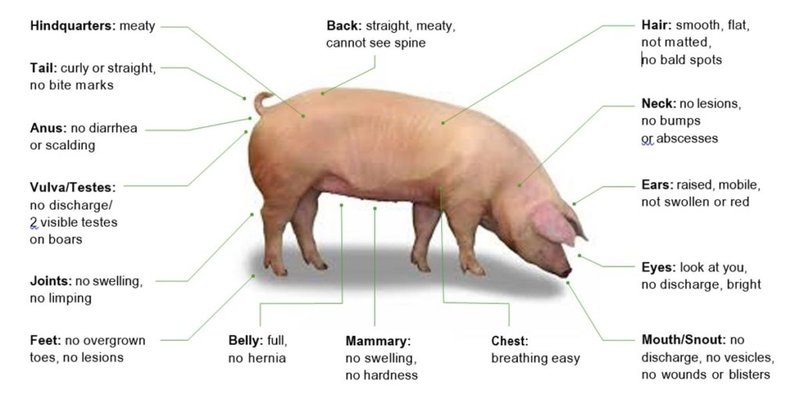
Whether you’re a seasoned farmer or just starting out, understanding pig health issues is essential. From common ailments like respiratory infections to more serious conditions such as swine fever, knowing what to look for can equip you to provide better care. Plus, there’s nothing worse than feeling helpless when your lovable pig is sick, right? Let’s dive into the nitty-gritty of pig health issues, covering the signs to watch for, preventative measures you can take, and the important times to call in a vet.
Common Health Issues in Pigs
When it comes to pig health, there are several common issues that can arise. Understanding these can help you catch problems before they become serious.
Respiratory Problems
Respiratory problems are among the most frequent health issues in pigs. Just like humans, pigs can suffer from colds, pneumonia, and chronic respiratory disease. Signs include coughing, wheezing, nasal discharge, and difficulty breathing. You might notice your pig separating itself from the herd or not eating as much—these can be red flags.
Why does this happen? It can be caused by poor ventilation, overcrowding, and even changes in temperature. Keeping your pigs in a clean and well-ventilated environment is key. Generally, if your pig is coughing more than usual, it’s time to pay attention.
Digestive Disorders
Another big player in pig health is digestive disorders. Known as “the stomach issues,” these can range from mild to severe. You might see signs like diarrhea, bloating, or loss of appetite. If your pig is not acting its usual self, it’s worth considering if there’s a digestive problem at play.
Common causes include sudden changes in diet, parasites, or infections. Preventative measures—like gradually introducing new feeds—can help minimize disruptions. If your pig’s diarrhea doesn’t improve within a day or two, you should definitely consult a vet.
Recognizing Behavioral Changes
Sometimes the first clue something’s off with your pig is a change in behavior. Pigs are creatures of habit and can be quite vocal about their needs.
Withdrawal from the Group
If you notice a pig isolating itself from the rest of the herd, that’s a signal. Pigs are social animals, and withdrawal can indicate distress or illness.
Watch for lethargy—is your pig moving slower than usual? Is it lying down more often? These are signs to investigate further.
Changes in Eating Habits
Another sign to watch for is if your pig isn’t eating as it normally would. Pigs usually have hearty appetites, so a sudden loss of interest in food can be an indicator that something’s wrong. If they are not eating, it might be worth checking for dental issues or other mouth-related problems too.
Preventative Measures for Pig Health
Prevention is always better than cure, especially when it comes to livestock. Here are some simple yet effective steps you can take to keep your pigs healthy.
Proper Nutrition
Feeding your pigs a balanced diet is fundamental. High-quality feed that’s appropriate for their age and weight is essential. Make sure they have access to clean water as well. Just like us, pigs need the right fuel to keep their bodies functioning properly.
Regular Health Checks
Conducting routine health checks can help you stay on top of your pig’s well-being. Look for signs such as lumps, skin rashes, or any unusual behavior. Think of it like a check-up; a few minutes every few weeks can make a world of difference.
Vaccinations
Vaccinations play a critical role in preventing common pig diseases. Talk to your vet about a vaccination schedule that works for your herd. It’s a proactive step that can save you from dealing with health crises later.
When to Call the Vet
Sometimes, despite your best efforts, your pig may need professional help. Knowing when to call the vet can make a huge difference in your pig’s recovery.
Persistent Symptoms
If you notice any persistent symptoms, like a continuous cough or diarrhea that doesn’t clear up in a day or two, it’s time to make that call. Ignoring these signs can turn a small issue into a major health crisis.
Changes That Don’t Improve
If your pig is showing behavioral changes that don’t improve after a day or two (like poor appetite or withdrawal), don’t hesitate to reach out for professional advice.
Emergency Situations
Lastly, if your pig is showing severe signs such as difficulty breathing, severe injuries, or unrelenting pain, contacting your vet immediately is essential. These situations require quick action to save your pig’s life.
Maintaining pig health is about being observant and proactive. By recognizing signs of health issues early on, taking preventative measures, and knowing when to call the vet, you are setting your pigs up for a healthy and happy life. Whether it’s a change in eating habits or simple respiratory issues, staying informed can ensure that you’re doing everything you can for your swine companions. So next time you’re out in the pen, take a moment to check in on your pigs—you just might catch something that needs your attention.
